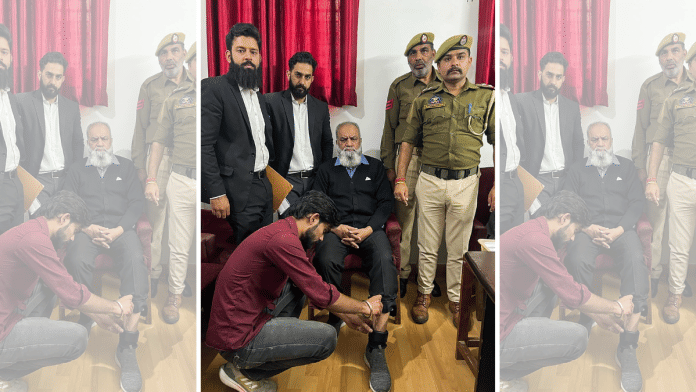New Delhi: The Jammu and Kashmir Police, which introduced GPS-enabled tracking anklets for the first time in the country this week, has decided to push for the wearing of these anklets as a bail condition for convicts, narcotics and terror accused on a case-by-case basis, ThePrint has learnt.
Sources in the security establishment told ThePrint that GPS anklets, which have to be worn by the accused 24/7 and cannot be cut off without raising an alarm, are part of technology-based assistance in preventing and tracking criminal activities. Such anklets are in use in many Western countries, including the US, they added.
The anklets introduced by the J&K police are made by an Indian firm and the police department is in the process of acquiring more, ThePrint has learnt.
“The Jammu and Kashmir Police is the first in the country to introduce this technology. They will be pushing for these anklets to be a bail condition for those accused of narco smuggling, terrorist activities, hardcore over-ground workers of terrorist groups to begin with,” said a source in the security establishment.
It is learnt that the project to introduce GPS trackers was discussed and approved last month, and accordingly, the State Investigation Agency (SIA) of the J&K Police made UAPA accused Ghulam Mohd Bhat wear a GPS anklet as he was released on bail this week.
Sources said that an accused or a convict can only be made to wear GPS anklets based on a court order. In Bhat’s case, a Special NIA Court, Jammu, passed the order.
As the system stabilises, the gamut of criminal cases for which these anklets would be sought will also be increased and will include domestic violence too, but on a case-by-case basis depending on the requirement, the sources further said.
Also Read: ‘Weakening DGP’s post’ — IPS backlash after additional secretary transfers 31 J&K police officers
How the anklets work
Sources explained that the anklet works through a SIM card and a police officer can track an accused in real time.
If the accused gets out of the perimeter restrictions, like outside the area of a particular police station or as fed into the system, a beep or an alarm will be sounded.
“The movement of the accused can be tracked real-time or even tracked back,” a second source said.
The tracking initially will be done by the centralised system and then such a facility will come up in different police jurisdictions, sources said, adding that the move will act as a deterrent to those accused of heinous crimes when out on bail.
Sources explained that it was found that several of those who step out of jail on bail go back to doing what they were arrested for.
“About two years back, the Jammu and Kashmir Police started seeking information regarding the kind of phone that the accused will use, who they will not meet as conditions for bail,” one of the sources cited above said.
A global trend
According to Pew research conducted in 2016, the number of accused and convicted criminal offenders in the United States who are monitored with ankle bracelets and other electronic tracking devices rose nearly 140 percent over 10 years.
More than 1,25,000 people were supervised with the devices in 2015, up from 53,000 in 2005.
Countries like Belgium are now reportedly introducing the next generation of tracking anklets that will now allow a victim to be alerted if the accused is nearby.
The system, which will come into use in the middle of next year, will give warnings to victims — via what has been termed a “victim app” — that an offender is approaching them or is violating their ban by entering certain areas.
Such systems are already in use in Spain, among some other countries.
(Edited by Richa Mishra)
Also Read: How Kiran Patel used ‘RSS link’ to start J&K con game. ‘Overacting’ & IAS-IPS confusion blew cover






